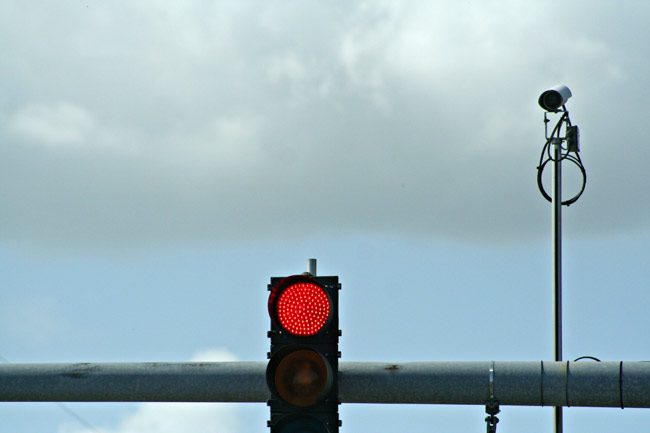
A few million dollars in revenue aside—before state law and successful lawsuits caught up with the fleecing–Palm Coast’s decade-long history with red-light cameras has not been a happy one.
Next year, that history is due to end as the city’s contract with its camera provider reaches its term. The city council’s current and incoming members have lost their appetite for the cameras, more than three dozens of which gridded intersections at the height of the program. Only four cameras are still operating, generating just $1,400 a month between them for the city. The rest goes to American Traffic Solutions, the private company that operates the system, and to the state.
But a decision at the federal 11th Circuit Court of Appeals Friday was a reminder that Palm Coast is still not clear of the legal shambles that have surrounded the cameras: Palm Coast and numerous other cities were at the losing end of Friday’s decision, which allows a class-action lawsuit against ATS and the cities it contracted with to go forward–including a provision that potentially could cost those cities millions of dollars in refunds owed drivers.
The lawsuit seeks to recoup for drivers the money they lost in fines in schemes the drivers claim in the suit to have been illegal.
Friday’s decision by a three-judge panel doesn’t address the question at the heart of the lawsuit. Rather, it ruled on a sort of side or interim appeal by ATS, Palm Coast and other cities.
ATS and the cities argued before the district court that cities like Palm Coast had sovereign immunity—that is, that they were immune from provisions compelling them to, in this case, provide refunds. The district court ruled against ATS and the cities, without yet ruling on the larger question of the lawsuit—the legality of the red-light camera scheme itself (or whether those refunds must be tendered).
ATS and the cities appealed the sovereign immunity part of the ruling to the 11th Circuit in Atlanta. The drivers who filed the original suit claimed the ATS argument was frivolous: they not only wanted the appeal dismissed. They wanted ATS and the cities penalized for filing a frivolous action.
On Friday, a three-judge panel, in a ruling so technical and plodding that even veteran lawyers’ eyes would glaze over it, upheld the district court’s decision: it denied ATS and the city’s claims to sovereign immunity, though it did so by finding that it had no jurisdiction to rule on the appeal since the case itself had not been completed at the district level. But the appeals court did not go so far as to find the claim frivolous. It found that the ATS claim was “not entirely meritless,” citing at least some lack of clarity in recent legal developments that may have clouded the two precedents ATS was contesting. But that lack of clarity was not enough for the federal court to weigh in further.
“According to the district court, Florida sovereign immunity does not apply to an unlawful extraction claim,” Circuit Judge Julie Carnes—appointed to the court by President Obama in 2014—wrote in the unanimous, 17-page opinion, meaning that if cities such as Palm Coast had illegally fined drivers, they would not be protected from lawsuits under the immunity doctrine: the district’s ruling on that count stands. So the lawsuit goes forward. Only after a judgment is rendered by the lower court can the appeals court then take up further questions.
The decision essentially means that a very long case—originally filed in 2011—will keep going, likely for a very long time, even after all cameras will have been removed from Palm Coast intersections. It also means that as Palm Coast and other cities fight the class-action suit, legal bills continue to pile up. But Palm Coast is one of 72 cities in the fight.
Absent a settlement, the court will eventually rule either for or against the drivers’ claims that they were illegally fined. If drivers win, it wouldn’t be the first time that ATS and cities it contracted with would have to reimburse drivers. ATS and Palm Coast went through that process locally a few years ago, though by then the process itself is laborious enough, putting the burden on drivers to reclaim a few dollars, that what money is paid out ends up being a small sum, compared to what was taken in. If that were to happen again as a result of the federal suit, it would be a long way off.
![]()
Click to access red-light-immunity.pdf





























Anonymous says
time to bankrupt ats!
Flatsflyer says
Wonder if Mitt Romnry is still a big investor in ATS?
Joe says
Nice to hear but unfortunately ATS has already made millions fleecing the citizens of Palm Coast and countless other communities around this country. Let this be a lesson to all future generations.
Born and Raised Here says
Still waiting for my refunds from the city.
Peter A Cerreta says
ONE FOR PEOPLE!!!!
Tony B says
So if I understand correctly, the Red Light cameras were deemed illegal, and monies collected are to be refunded? That would be mint!
Would you believe I got a “Notice of Violation” in the mail today (my new-driver-son). Why would I pay this? What are the pros and cons of not paying it? Thanks for any suggestions.